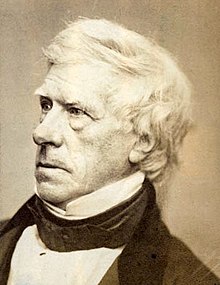Lord Brougham
|
The Right Honourable The Lord Brougham and Vaux PC QC FRS |
|
|---|---|
 |
|
| Lord Chancellor | |
|
In office 22 November 1830 – 9 July 1834 |
|
| Monarch | William IV |
| Prime Minister | The Earl Grey |
| Preceded by | The Lord Lyndhurst |
| Succeeded by | The Lord Lyndhurst |
| Personal details | |
| Born |
19 September 1778 Cowgate, Edinburgh |
| Died | 7 May 1868 (aged 89) Cannes, France |
| Nationality | British |
| Political party | Whig |
| Spouse(s) | Mary Anne Eden (1785–1865) |
| Alma mater | University of Edinburgh |
Henry Peter Brougham, 1st Baron Brougham and Vaux PC QC FRS (/ˈbruːəm, ˈbruːm ənd ˈvoʊks/; 19 September 1778 – 7 May 1868), was a British statesman who became Lord Chancellor of Great Britain.
As a young lawyer in Scotland, Brougham helped to found the Edinburgh Review in 1802 and contributed many articles to it. He went to London, and was called to the English bar in 1808. In 1810 he entered the House of Commons as a Whig. Brougham took up the fight against the slave trade and opposed restrictions on trade with continental Europe. In 1820, he won popular renown as chief attorney to Queen Caroline, and in the next decade he became a liberal leader in the House. He not only proposed educational reforms in Parliament but also was one of the founders of the Society for the Diffusion of Useful Knowledge in 1825 and of University College London in 1826. As Lord Chancellor from 1830 to 1834 he effected many legal reforms to speed procedure and established the Central Criminal Court. In later years he spent much of his time in Cannes, which he established as a popular resort.
...
Wikipedia
